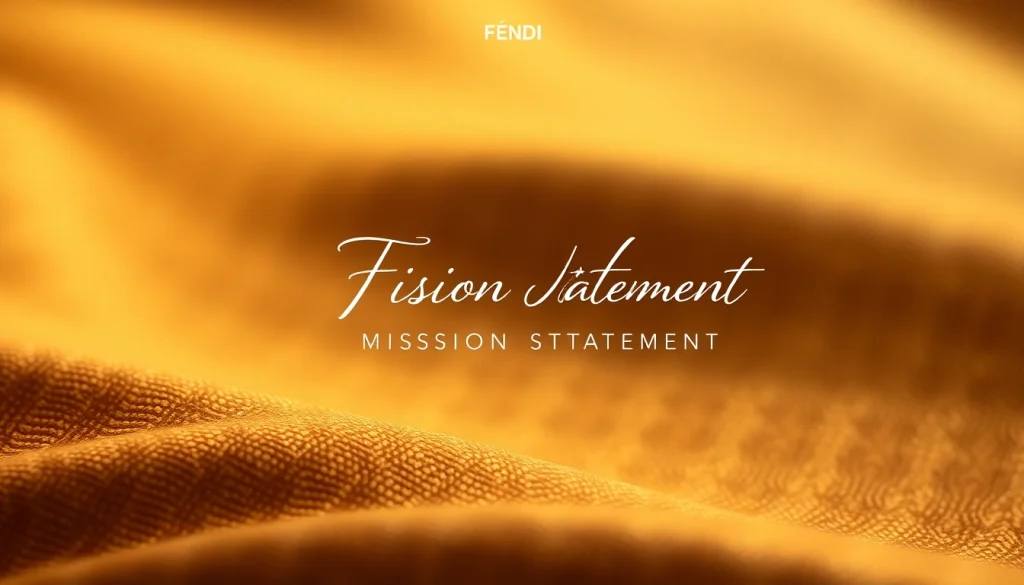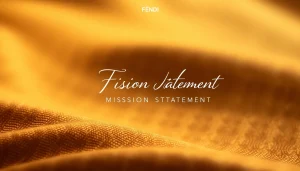
Understanding the Fendi Mission Statement
At the core of a luxury brand’s identity lies its mission statement, which serves as a guiding principle for its values, culture, and overall direction. Fendi’s mission statement is pivotal in encapsulating the brand’s commitment to craftsmanship, quality, and innovation, enabling the brand to resonate with its customers and maintain its prestigious position in the luxury market. By analyzing the fendi mission statement, we can delve into the core aspects of what defines Fendi’s ethos in the competitive landscape of luxury fashion.
Defining Core Values in Luxury Fashion
The essence of luxury fashion is built on a foundation of core values that resonate deeply with consumers. For Fendi, the values of heritage, boldness, and innovation play a significant role in shaping its identity. Heritage reflects the deep-rooted history and craftsmanship that translate into each product, while boldness inspires the brand to innovate and take risks in design. Innovation hence is not merely about design but encompasses a holistic approach, balancing modernity with tradition.
Importance of Craftsmanship in Fendi’s Mission
Craftsmanship is a cornerstone of Fendi’s mission. Fendi emphasizes the importance of artisanal skills, ensuring that each piece is crafted with unparalleled attention to detail. The brand cherishes its artisans, fostering a culture where traditional methods merge with contemporary artistry. This devotion to craftsmanship not only enhances product quality but also creates a narrative that appeals to discerning customers who value authenticity and expertise.
Sustainability and Ethical Practices Reflected in the Mission
Today, sustainability is integral to the fashion industry’s future, and Fendi embraces this challenge head-on. The brand’s mission incorporates ethical practices, demonstrating a commitment to minimizing environmental impact while maximizing social responsibility. This includes initiatives aimed at reducing waste, using sustainable materials, and promoting ethical labor practices—essential components that resonate with the values of modern consumers.
Historical Context of Fendi’s Mission Statement
The Evolution of Fendi: A Journey Through Time
Fendi’s genesis dates back to 1925, founded as a fur and leather goods shop in Rome. Over the decades, the brand has astutely evolved, transitioning from a local artisan shop to a global powerhouse in luxury fashion. This journey reflects a perpetual commitment to excellence, which remains embedded in the brand’s mission. The evolution of Fendi highlights the significance of adapting to changing fashion landscapes while steadfastly maintaining a commitment to quality and innovation.
How Historical Values Shape Today’s Mission
The historical values of Fendi serve as a bedrock upon which its mission is built. The commitment to superior craftsmanship, an eye for detail, and a culture of innovation can be traced back to its inception. As Fendi navigates contemporary fashion challenges, these historical values continue to inform its practices, underpinning its mission to retain legacy while embracing modernity.
Cultural Impact of Fendi in the Fashion Industry
Fendi has established itself as a beacon of cultural influence within the fashion industry. It’s not simply about fashion; Fendi contributes to cultural dialogue through collaborations with artists, innovative collections, and participation in global initiatives. The brand’s flair for creativity fosters an environment where fashion meets culture, allowing Fendi to impact lifestyle choices and shape consumer perceptions of luxury.
Breaking Down the Key Components of the Fendi Mission Statement
Quality: The Pillar of Fendi’s Philosophy
Quality is non-negotiable in luxury fashion. Fendi’s mission imbues the brand with a relentless pursuit of excellence. By employing the finest materials and skilled artisans, Fendi ensures that every piece meets the highest standards of quality, remaining consistent with the expectations of its clientele. This dedication strengthens customer loyalty and enhances brand reputation within the luxury landscape.
Innovation: Honoring Tradition While Embracing Change
The juxtaposition of tradition and innovation lies at the heart of Fendi’s operational philosophy. While celebrating its rich history of craftsmanship, Fendi is also unyielding in its pursuit of innovation across fashion lines. Whether through adopting cutting-edge technologies in production or launching avant-garde designs, Fendi exemplifies how a luxury brand can stay relevant in a rapidly evolving market while holding onto its roots.
Craftsmanship: A Commitment to Artistry
Artistry and craftsmanship are not merely initiatives for Fendi; they form the quintessence of its brand identity. The brand’s artisans are revered for their skills, with many undergoing years of training to perfect their craft. This commitment to artistry is reflected in every product, allowing consumers to appreciate not only the aesthetic appeal but also the labor and love imbued in each piece. Fendi’s mission articulates this dedication to craftsmanship, differentiating it in crowded luxury segments.
Implementing the Fendi Mission Statement in Business Practices
Best Practices for Upholding Mission-Driven Brand Initiatives
To effectively implement its mission statement, Fendi has outlined best practices that ensure alignment across all business operations. This involves regular trainings for employees to instill the mission’s principles, creating a seamless integration of mission-focused initiatives within marketing strategies, and involving artisans in product design discussions. Monitoring and continuous improvement mechanisms are also critical to aligning business operations with the mission.
Measuring the Success of Fendi’s Mission Implementation
Success in mission implementation can be evaluated through various metrics, such as customer satisfaction scores, brand loyalty indices, and employee engagement levels. Fendi also utilizes feedback loops, allowing for consumer and employee input to reflect on how well the brand embodies its mission. These insights can lead to necessary adjustments, ensuring the mission is not only stated but lived through every facet of the organization.
Examples of Successful Mission Integration in Projects
Fendi has several successful initiatives that reflect its mission statement. For instance, the brand’s involvement in sustainable fashion through innovative materials and environmentally-friendly production processes echoes its commitment to ethical practices. Additionally, Fendi’s engagement in artistic collaborations has led to unique limited-edition pieces that champion both artistry and craftsmanship, further solidifying its position within luxury markets.
The Future of Fendi’s Mission Statement
Adapting to Industry Changes and Consumer Demands
Looking ahead, Fendi must adapt to an ever-evolving fashion landscape and changing consumer preferences. This adaptability will likely see Fendi leverage technology, including AI and digital platforms, to enhance customer engagement and operational efficiency. By continuously listening to consumer feedback and aligning its mission with emerging trends, Fendi aims to maintain its esteemed position in the luxury marketplace.
Long-Term Vision and Goals for Sustainability
Fendi recognizes the urgent need for sustainability in fashion. The long-term vision includes initiatives to minimize the brand’s carbon footprint and to promote circular fashion. This involves developing products with longevity in mind and fostering transparency in the supply chain. Fendi’s ongoing commitment to sustainability is woven into its mission, ensuring that the brand remains not only forward-thinking but also responsible.
New Initiatives Inspired by the Fendi Mission
Innovation remains a key cornerstone of Fendi’s future strategies. New initiatives inspired by its mission may include introducing groundbreaking materials, enhancing artisan training programs, or leveraging partnerships that align with its core values. By synthesizing creativity with sustainability, Fendi aspires to redefine luxury for future generations while remaining grounded in its original mission.





